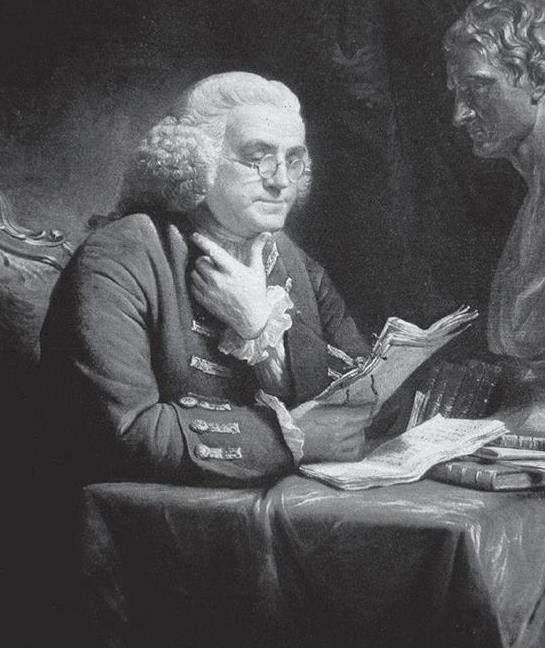The 5-Hour Rule五小时原则
Michael Simmons

在10 歲那年,本杰明·富兰克林就离开了正规的学校教育成了学徒。而当他离世之时,他已成为美国最受人敬重的政治家、发明家、作家以及企业家。在他的一生中,究竟是什么让他获得了如此迅速的提升呢?
Throughout Benjamin Franklin’s adultlife, he consistently 1)invested roughly anhour a day in deliberate learning. Now it iscalled Franklin’s five-hour rule: one hour aday on every weekday.
Franklin’s learning time consisted of:waking up early to read and write, settingpersonal-growth goals and 2)trackingthe results, creating a club for “like-minded aspiring artisans andtradesmen who hoped to improve themselves while they improved theircommunity”, turning his ideas into experiments, having morning andevening 3)reflection questions.
Every time that Franklintook time out of his busy dayto follow his five-hour rule andspend at least an hour learning,he accomplished less on thatday. However, in the long run, it
was 4)arguably the best investment of histime he could have made.
Franklin’s five-hour rule reflects the verysimple idea that, over time, the smartestand most successful people are the oneswho are constant and deliberate learners.
The core concept: empty space
To find out, we need look no further than chess grandmaster andworld-champion martial artist Josh Waitzkin. Instead of 5)squeezinghis days for the maximum productivity, he’s actually done theopposite. Waitzkin, who also authored The Art of Learning, purposelycreates 6)slack in his day so he has “empty space” for learning,creativity, and doing things at a higher quality. Here’s his explanationof this approach: “I have built a life around having empty space forthe development of my ideas for the creative process. And for thecultivation of a physiological state which is receptive enough to tunein very, very deeply to people I work with… In the creative process,it’s so easy to drive for efficiency and take for granted the really subtleinternal work that it takes to play on that razor’s edge.”
Adding slack to our day allows us to:
1. Plan out the learning. This allows us to think carefully about what we want to learn. We shouldn’t just have goals for what we want to accomplish. We should also have goals forwhat we want to learn.
2. Deliberately practice. Rather than doingthings automatically and not improving, wecan apply the proven principles of deliberatepractice so we keep improving. This meansdoing things like taking time to get honest feedback on our work andpracticing specific skills we want to improve.
3. Ruminate. This helps us get more perspective on our lessonslearned and assimilate new ideas. It can also help us develop slowhunches in order to have creative breakthroughs. Walking is a greatway to process these insights, as shown by many greats who wereor are walking fanatics, from Beethoven and Charles Darwin to SteveJobs and Jack Dorsey. Another powerful way is through conversationpartners.
4. Set aside time just for learning.This includes activities like reading,having conversations, participating in amastermind, taking classes, observingothers, etc.
5. Solve problems as they arise. Whenmost people experience problems duringthe day, they sweep them under the rugso that they can continue their to-do list.Having slack creates the space to address small problems before theyturn into big problems.
1) invest v. 投入
2) track v. 追踪
3) reflection n. 思考;沉思
4) arguably adv. 可以说
5) squeeze v. 挤出
6) slack n. 富余部分
词组加油站
consist of 由……组成
take for granted 认为……是理所当然
set aside 留出(钱或时间)
6. Do small experiments with big potential payoffs. Whether or notan experiment works, it’s an opportunity to learn and test your ideas.
本杰明·富兰克林成年以后,坚持每天都抽出约一小时用来学习,这称之为“富兰克林的五小时原则”:每个工作日,每日一小时。
富兰克林的学习时间包括:早起读书写作;设立个人成长目标并跟踪结果;为那些志趣相投且有抱负的艺术家和商人们成立一个俱乐部,让他们在为社会做贡献的同时也能不断提升自己;将想法付诸实践;早晨和晚上都提出一些思考问题。
每次,富兰克林都会在繁忙的一天中抽出一小时践行他的五小时原则,这看似使他当天完成的任务减少了,但从长远来看,这可以称为他为自己的时间做出的最好投资。
富兰克林的五小时原则说明了一个很简单的道理:最聪明、最成功的那些人,其实正是那些能够持续用心学习的人。
核心原则:留白
国际象棋大师和世界冠军武术家乔希·维茨金就是最好的证明。维茨金并没有为了追求最大化的高产能而去挤时间,事实上,他所做的恰恰相反。作为《学习之道》一书的作者,他有意在一天中挤出空闲,把“时间留白”用以学习、创意并提升做事效率。他这样解释自己的这一方法:“我构建的这种生活能够使我有时间发展一些创意,并且能够使我和同事之间的关系更加融洽。在这一创造性过程中,效率很容易得到提高,而且这种微妙的内部工作在紧急关头也能够发挥作用。”
给生活“留白”能够使我们:
1. 规划学习。这让我们能够认真考虑自己想要学习的东西。我们不应只为那些我们想完成的事情树立目标,也应为那些我们想学到的知识树立目标。
2. 专门练习。我们可以利用一些已被证实的原则进行专门练习,从而使自己得到提高,而不是漫无目的地去做事而毫无进步。这意味着做这些事情时,我们需要像在工作中一样花时间得到诚实反馈,或者练习一些我们希望获得的特殊技能。
3. 沉思。这能使我们对学到的经验产生更多领悟和吸收新的观点,也能使我们缓慢积累一些想法,这样才能产生创造性的突破。散步是处理这些想法的一个好方式,贝多芬、查尔斯·达尔文、史蒂夫·乔布斯和杰克·多西都是散步的狂熱爱好者。另一个有效的方式则是与同伴沟通交流。
4. 专门为学习留出时间。这包括阅读、对话、参与策划、参加课程以及观察他人等活动。
5. 问题一经出现就立即解决。当天遇到问题的时候,很多人会采取回避的方法以便继续完成自己的待办清单。留白为人们创造出一个在小问题变成大问题之前就进行解决的空间。
6. 去做具有巨大潜在回报的小尝试。一次尝试无论成功与否,都是一个学习和验证自己想法的机会。

